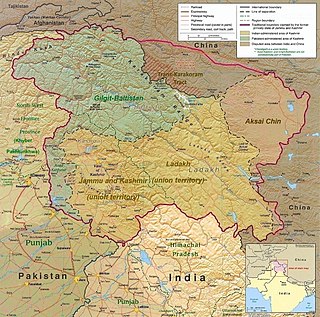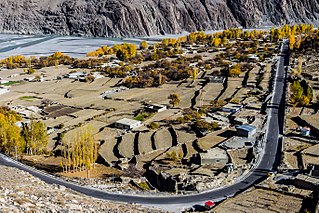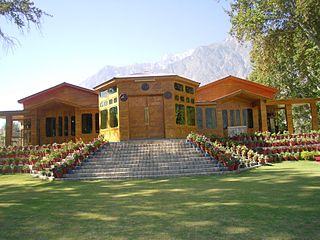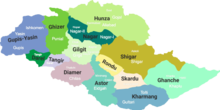
The Indo-Pakistani war of 1947–1948, also known as the first Kashmir war, was a war fought between India and Pakistan over the princely state of Jammu and Kashmir from 1947 to 1948. It was the first of four Indo-Pakistani wars between the two newly independent nations. Pakistan precipitated the war a few weeks after its independence by launching tribal lashkar (militias) from Waziristan, in an effort to capture Kashmir and to preempt the possibility of its ruler joining India.

Gilgit is a city in Pakistani-administered Gilgit–Baltistan in the disputed Kashmir region. It is the capital of the Gilgit-Baltistan region. The city is located in a broad valley near the confluence of the Gilgit and the Hunza rivers. It is a major tourist destination in Pakistan, serving as a hub for trekking and mountaineering expeditions in the Karakoram mountain range.

Skardu is a city located in Pakistan administered Gilgit-Baltistan in the disputed Kashmir region. Skardu serves as the capital of Skardu District and the Baltistan Division. It is situated at an average elevation of nearly 2,500 metres above sea level in the Skardu Valley, at the confluence of the Indus and Shigar rivers. It is an important gateway to the eight-thousanders of the nearby Karakoram mountain range. The Indus River running through the region separates the Karakoram from the Ladakh Range.

The Gilgit Agency was an agency within the British Indian Empire. It encompassed the subsidiary states of the princely state of Jammu and Kashmir situated along the northern border. The primary objective of establishing the Gilgit Agency was to bolster and fortify these regions, particularly in the context of concerns about Russian encroachment in the area. The subsidiary states encompassed Hunza, Nagar and other states in the present day districts of Gupis-Yasin, Ghizer, Darel, Tangir and Diamer. The agency headquarters was based in the town of Gilgit, within the Gilgit tehsil of Jammu and Kashmir.
The following is a timeline of the Kashmir conflict, a territorial conflict between India, Pakistan and, to a lesser degree, China. India and Pakistan have been involved in four wars and several border skirmishes over the issue.

Gilgit-Baltistan, formerly known as the Northern Areas, is a region administered by Pakistan as an administrative territory and consists of the northern portion of the larger Kashmir region, which has been the subject of a dispute between India and Pakistan since 1947 and between India and China since 1959. It borders Azad Kashmir to the south, the province of Khyber Pakhtunkhwa to the west, the Wakhan Corridor of Afghanistan to the north, the Xinjiang region of China to the east and northeast, and the Indian-administered union territories of Jammu and Kashmir and Ladakh to the southeast.

The Gilgit Scouts was a paramilitary force within the Gilgit-Baltistan region in northern Pakistan. They were raised by the British Raj in 1913, on behalf of the princely state of Jammu and Kashmir, to police the Gilgit Agency, which formed the northern frontier of British India. The force was composed of local men recruited by British commanders.

Brigadier Sher Jung Thapa MVC was a military officer of the Jammu and Kashmir State Forces and later the Indian Army. Revered as the Hero of Skardu, he was a recipient of the Indian Army's second highest gallantry award, the Maha Vir Chakra (MVC).
Gilgit-Baltistan is an administrative territory of Pakistan that borders the province of Khyber Pakhtunkhwa to the west, Azad Kashmir to the southwest, Wakhan Corridor of Afghanistan to the northwest, the Xinjiang Uyghur Autonomous Region of China to the north, and the Indian-administered region of Jammu and Kashmir to the south and south-east.

The history of Azad Kashmir, a disputed part of the Kashmir region currently administered by Pakistan, is related to the history of the Kashmir region during the Dogra rule. Azad Kashmir borders the Pakistani provinces of Punjab and Khyber Pakhtunkhwa to the south and west respectively, Gilgit–Baltistan to the north, and the Indian union territory of Jammu and Kashmir to the east. The region is claimed by India and has been the subject of a dispute between India and Pakistan since 1947.

The siege of Skardu was a prolonged military blockade carried out by the Gilgit Scouts, Chitral Scouts and Chitral State Bodyguards, acting in coordination against Jammu and Kashmir State Forces and the Indian Army in the town of Skardu, during the First Kashmir War of 1947.

Hunza District is a district of Pakistan-administered Gilgit-Baltistan in the disputed Kashmir region. It is one of the 14 districts of the Gilgit-Baltistan region. It was established in 2015 by the division of the Hunza–Nagar District in accordance with a government decision to establish more administrative units in Gilgit-Baltistan. The district headquarters is the town of Karimabad.

In spring 1947, an uprising against the Maharaja Hari Singh of Jammu and Kashmir broke out in the Poonch jagir, an area bordering the Rawalpindi district of West Punjab and the Hazara district of the North-West Frontier Province in the future Pakistan. It was driven by grievances such as high taxes, the Maharaja's neglect of World War veterans, and above all, Muslim nationalism with a desire to join Pakistan. The leader of the rebellion, Sardar Ibrahim Khan, escaped to Lahore by the end of August 1947 and persuaded the Pakistani authorities to back the rebellion. In addition to the backing, Prime Minister Liaquat Ali Khan authorised an invasion of the state, by the ex-Indian National Army personnel in the south and a force led by Major Khurshid Anwar in the north. These invasions eventually led to the First Kashmir War fought between India and Pakistan, and the formation of Azad Kashmir provisional government. The Poonch jagir has since been divided across Azad Kashmir, administered by Pakistan and the state of Jammu and Kashmir, administered by India.

Muhammad Aslam Khan better known as Colonel Pasha, The Legend of Baltistan, and Laji, was a former one-star rank Pakistan Army officer, businessman, and founder of the Shangrila Resort. Notably, as the leader of 'D' Company, he led his troops during World War II in capturing Kennedy Peak (Myanmar), which the Americans had failed to conquer. For this achievement, he was awarded the Military Cross by Field Marshal Auchinleck.
William Alexander BrownMBESI was a British military officer based in British-ruled India. He is best known for his actions during the Partition of India, when he assisted the locals of the Gilgit Agency and led a coup d'état, codenamed Operation Datta Khel, against Hari Singh, the Maharaja of the erstwhile princely state of Jammu and Kashmir. The successful coup ultimately resulted in the Gilgit Agency becoming a part of Pakistani-administered Kashmir following the First Indo−Pakistani War.

Bunji Bridge is a suspension bridge on the Indus River near Bunji, a town in the Astore District of Gilgit-Baltistan, Pakistan. It was first built in the 19th century by the Maharaja Pratap Singh's government of the princely state of Jammu and Kashmir. Its wooden girders were burnt down during the 1947 Gilgit Rebellion and subsequently repaired. It fell into disuse and neglect in recent decades. It was restored by the recently established Government of Gilgit-Baltistan in 2012 after the 2010 Indus floods highlighted its value. The bridge is said to serve as a vital link between the town of Gilgit and the locations in the Astore District.

Bunji (Urdu:بنجی) is a town in Astore District of Gilgit-Baltistan region in Pakistan. It was historically important, being on the edge of the ancient Yagistan. It was economically a hub for barter trade between Yagistan and Dogras. The distance from Bunji to Gilgit is about 50 kilometres (31 mi) on the Karakoram Highway. Bunji, located at the junction of three Great Mountain Ranges, has its historical importance. The village has its prominent traces in the socio-political and economical situations of the region in History. Literacy rate of bunji is almost 100 percent except outsider coming from other places for jobs. River Indus covers the village from North to west while from eastern side it is connected with river Astore. Baltistan region joins its territory from the North-East.

Gilgit-Baltistan Independence Day is celebrated on 1 November every year as independence from Dogra Raj in 1947 but Independence day of Baltistan is 14 August 1948. Every 1 November is a holiday in Gilgit-Baltistan, the flag hoisting ceremony is attended by the Governor, Chief Minister, Force Commander Northern Areas along with civil and military officials and war veterans of GB.

In November 1947, the paramilitary force of Gilgit Scouts stationed at Gilgit rebelled against the princely state of Jammu and Kashmir, soon after it acceded to the Indian Union. Under the command of a British officer Major William Brown, they executed a coup d'etat, overthrew the governor Ghansara Singh, and imprisoned him. The Muslim troops of Jammu and Kashmir State Forces stationed at Bunji joined in the rebellion, under the command of Captain Mirza Hassan Khan, imprisoned their own commander Colonel Abdul Majid and eliminated the non-Muslim troops. A provisional government was declared under a local chief Shah Rais Khan, which lasted for about two weeks. On 16 November, a Pakistani political agent Khan Mohammad Alam Khan arrived and took over the administration.

The Action at Tsari occurred during the Indo-Pakistani war of 1947–1948 in the Gilgit-Baltistan sector at Tsari, on the banks of the Indus River near Skardu, from 11 to 12 February 1948. The conflict involved the Gilgit Scouts and the Jammu and Kashmir forces. The Ibex Force of the Gilgit Scouts, led by Major Ehsan, planned an attack on the Tsari outposts along the Indus River. These outposts had been established by Colonel Sher Jung Thapa as a defensive measure and to warn the Skardu garrison in case of an assault. Upon the arrival of the Gilgit Scouts, the Muslim troops stationed at the state forces' outpost, including their commander, Captain Nek Alam, defected to the Gilgit Scouts.

















